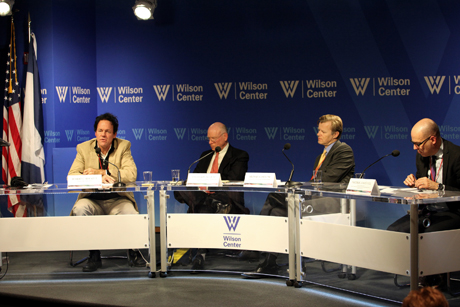Wealth imbalances, lack of structure drive economic crisis
By Marijo Wright Dowd

The global financial crisis will remain until imbalances of wealth are addressed, concluded two of three experts who spoke at a panel discussion March 19 at the Woodrow Wilson International Center for Scholars in Washington, D.C.
Michael Casey '94, managing editor at Dow Jones and The Wall Street Journal, said the imbalance of wealth among countries creates havoc with world financial markets. "One cannot talk about wealth in one country without talking about debt in another," he said. "In an international economy you can't have one without the other. So you have to think about the systems that are in place, the structures that are in place that create these imbalances."
For example, he said, China's wealth and oversaving in the last decade helped to create the collapse of the housing market in the United States in 2007 and 2008. "Without that pool of money coming from China, you would not have driven interest rates to the ridiculously low levels that they did," Casey added. "They're inseparable, these things."
Robert Hockett, Cornell professor of law, added that imbalances in personal wealth are destabilizing as well. For example, people with higher incomes eventually start to consume less and instead search for new investment products, such as bundled mortgages.
"Basically, any time you find really, really profound inequalities of wealth and income over certain periods of time you find heightened financial volatility and market crash very shortly thereafter," said Hockett, who noted that we are still in the midst of a global crisis. "It's not an acute crisis in the sense of a kind of cholera attack or an Ebola attack. It's more in the nature of chronic fatigue syndrome, a sort of ongoing low-grade fever."
Knight Kiplinger '69, editor-in-chief of The Kiplinger Letter and Kiplinger Personal Finance, offered a more optimistic view of the global financial crisis. It is regional, not global, said Kiplinger, and largely restricted to the United States, the European Union and Japan.
"Outside of the advanced nations there are exciting, very positive things happening. A huge new global middle class is developing in the less developed nations of the world," said Kiplinger.
There was agreement among the panelists that globalization has completely intertwined the world's financial sector. According to Casey, $4 trillion in transactions occur every day in the world's financial markets.
"You can put money into the euro and then back out of the euro within a nanosecond. That's what globalization is right now," Casey said.
However, it is a financial market operating without a framework. The vote in Cyprus to tax bank depositors is an example of the interconnectivity of global financial markets trying to operate without an international framework.
"The problem is we have political structures that are still very much entrenched around the nation state. That's Europe's problem in a nutshell," said Casey.
The event, sponsored by the Cornell Club of Washington, the Woodrow Wilson Center and the Mario Einaudi Center for International Studies, was moderated by Fredrik Logevall, Cornell professor of history and director of the Einaudi Center.
Marijo Wright Dowd is a freelance writer in the Washington, D.C., area.
Media Contact
Get Cornell news delivered right to your inbox.
Subscribe